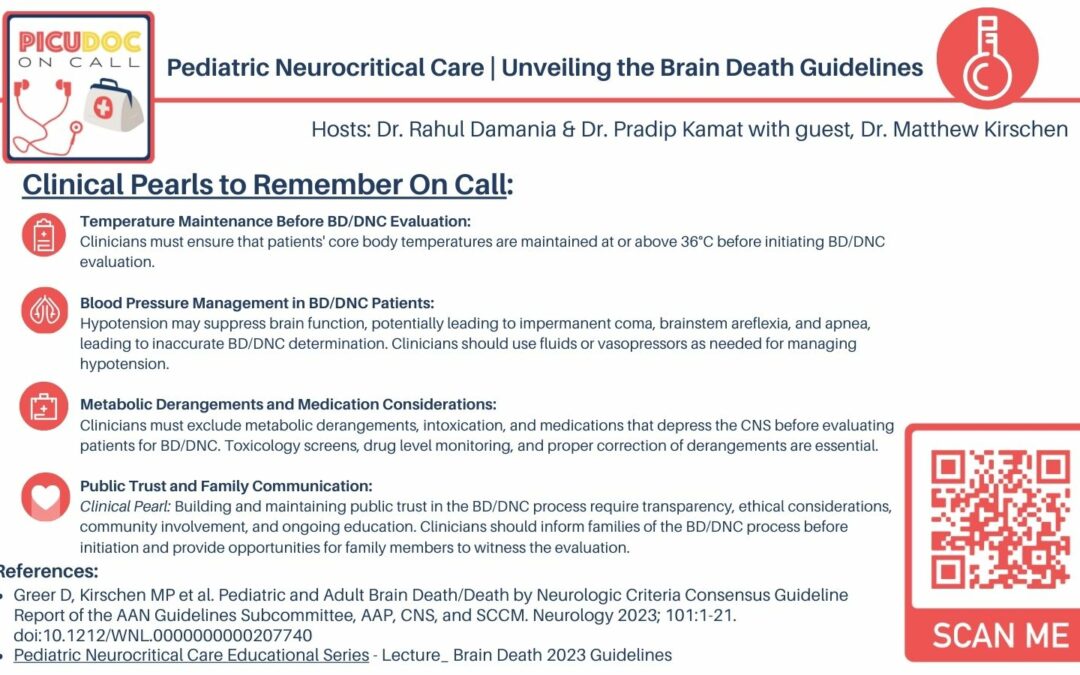Today, Dr. Pradip Kamat (Children’s Healthcare of Atlanta/Emory University School of Medicine) and Dr. Rahul Damania (Cleveland Clinic Children’s Hospital), are excited to speak with Matthew Kirschen, MD, PhD, FAAN, FNCS, regarding a very sensitive topic involving pediatric brain death guidelines published in ‘Neurology’ in October 2023. Dr. Matthew Kirschen, a leader in pediatric neurocritical care and one of the authors of the new guidelines.
Guest Introduction:
Dr. Matthew Kirschen is an Assistant Professor of Anesthesiology and Critical Care Medicine, Pediatrics, and Neurology at the Children’s Hospital of Philadelphia. A proud alumnus of Brandeis University and Stanford, where he secured both his MD and PhD in neuroscience. Dr. Kirschen’s journey includes a residency at Stanford followed by a unique dual fellowship in neurology and pediatric critical care at CHOP. Notably, he’s among the rare professionals dual-boarded in both PCCM and Neurology.
Dr. Kirschen’s tireless endeavors in pediatric neuro-critical care, especially his work on multimodal neuro-monitoring to detect and prevent brain injuries in critically ill children, have garnered significant attention. His expertise also extends to predicting recovery post-severe brain injuries. Pertinent to today’s discussion, Dr. Kirschen has displayed a keen interest in the precise diagnosis of brain death and proudly stands as one of the authors of the new guidelines on the topic of Pediatric and Adult Brain death/death by neurologic criteria.
Discussion:
1. Understanding Brain Death Criteria:
- Brain Death/Death by Neurologic Criteria (BD/DNC) declared with permanent cessation of all brain functions, including brainstem
- Important considerations before BD/DNC determination:
- No evaluation in infants < 37 weeks corrected gestational age
- Absence of coma, intact brainstem reflexes, and spontaneous breathing inconsistent with BD/DNC
2. Who Can Perform BD/DNC Evaluations:
- Attending clinicians must be credentialed and trained in BD/DNC evaluation.
- Two attending clinicians are needed for evaluation, with exceptions for advanced practice providers.
3. Prerequisites for BD/DNC Determination:
- Importance of identifying the etiology of BD/DNC to avoid reversible processes
- Observation periods based on age and type of brain injury
- Maintaining core body temperature before evaluation
4. Blood Pressure Management:
- Hypotension can lead to impermanent coma; clinicians should manage with fluids or vasopressors.
- Specific blood pressure targets for different ECMO support types
5. Medication Considerations:
- Excluding medications affecting CNS function before BD/DNC evaluation
- Recommendations for drug level monitoring and metabolic derangement exclusion
6. Performing the BD/DNC Neurologic Examination:
- Two independent examinations by different clinicians with a minimum 12-hour interval
- Central components including assessing irreversible coma and brainstem reflexes
7. Apnea Testing:
- Two apnea tests after each neurologic examination
- Procedures, complications, and baseline PCO2 and pH considerations
8. Ancillary Tests:
- BD/DNC remains a clinical evaluation; ancillary tests are used in specific circumstances.
- Conditions and circumstances for using or not using ancillary tests
9. Case Presentation and Family Communication:
- Real-life case presented and discussed following the new AAN guidelines.
- No need for consent before evaluation; communication with the family emphasized.
- Maintaining transparency and involvement in the BD/DNC process
10. Public Trust in BD/DNC:
- Building trust through education, transparency, public involvement, and ethical considerations
- Continuous improvement, professional collaboration, and legal frameworks
We welcome you to share your feedback, subscribe & place a review on our podcast! Please visit our website picudoconcall.org which showcases our episodes as well as our Doc on Call management cards. PICU Doc on Call is co-hosted by Dr. Pradip Kamat and Dr. Rahul Damania. Stay tuned for our next episode! Thank you!
References:
- Greer D, Kirschen MP et al. Pediatric and Adult Brain Death/Death by Neurologic Criteria Consensus Guideline Report of the AAN Guidelines Subcommittee, AAP, CNS, and SCCM. Neurology 2023; 101:1-21. doi:10.1212/WNL.0000000000207740
- Pediatric Neurocritical Care Educational Series – Lecture_ Brain Death 2023 Guidelines

